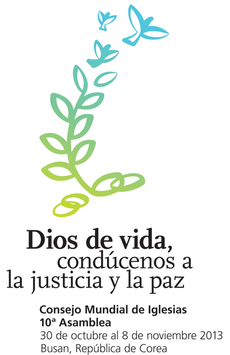Community of women and men in the church: mutual recognition and transformative justice (EC 09)
|
Friday
01 Nov 2013
16:15 - 17:45
|
Session 2, Convention Hall, Room 107 |
The church, as a prophetic sign in today’s world, is called to embody a true community of women and men. Such an inclusive community is God’s gift and promise for humanity, being created “in God’s image,” male and female (Gen 1:27). To enliven this ideal during the 10th Assembly, this ecumenical conversation will create a space to explore how “what we are, we ought to become” (Philip Potter). It will be a space for celebrating and furthering the 60 years of women’s active praxis for a just community of women and men in the church. While acknowledging the still-existing challenges to becoming this community, there will also be a call for mutual accountability in different ministries of the church as to how we have been or not have been a community of women and men. Echoing the assembly theme, the ecumenical conversation will also be a call to transformative justice in response to the often-acknowledged
backlash to the gains that the ecumenical movement made through the earlier agency of the ecumenical foremothers.
Through various methodologies the ecumenical conversation will explore these questions: In what ways has the church been a community of women and men? What have been the existing challenges to the called-to-be-one church’s vision of being and living as a community of women and men? What programmes, concrete actions and theologies should the churches, the ecumenical movement and ecumenical partners design and engage with so as to make sure that the call to unity for justice and peace is pursued together as a just and inclusive community of women and men? How can the ecumenical process of building a community of women and men better enhance the “cross-fertilisation” advocacy process with the UN CSW?




